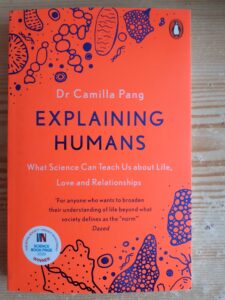
Explaining Humans draws parallels between the author’s conditions/diagnoses, such as autism and ADHD, and the author’s interest in science, in order to devise coping strategies for the real world, including better thinking patterns where relationships are concerned at the micro and macro level. Sometimes it was like reading a sociology or philosophy book, though I found the content to be interesting, relevant, and individualistic, which I liked.
I’d often think ‘Oh, that’s interesting’, ‘just like me or someone I know’, or something similar. One of the best parts, I felt, was the author’s sense of humour hanging onto the end of sentences. Explaining Humans had been what I was looking for where autism was concerned, and I took great pleasure reading the author’s past experiences and then growth beyond these.
I struggled to understand many of the science-based strategies and how they could be made relevant. In this way, the book was less helpful than I had hoped. It was something that I had fun reading in the present, with curiosity, but it’s not something that will stick with me beyond that.
If you’re looking for an autism/ADHD book, or a ‘lighter’ read for science enthusiasts, you can’t go wrong giving Explaining Humans a try. It may inspire you in different ways.
